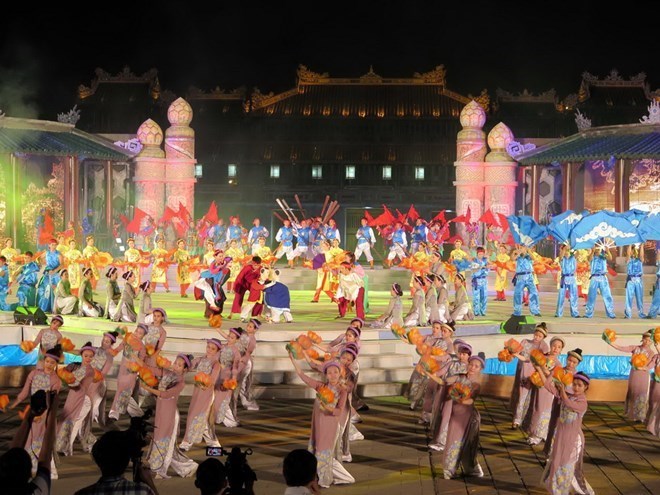
The central province of Thua Thien-Hue is appealing for more financial resources to organise the 10th Hue Festival, which is scheduled to take place from April 27 to May 2.
An art performance at Hue Festival 2016 (Photo: VNA).
The province has signed cooperation agreements with five main sponsors for the festival, namely Acecook Vietnam joint Stock Company, Carlsberg Vietnam Trading Co., Ltd., the Vietnam Bank for Agriculture and Rural Development’s branch in Thua Thien-Hue, the national flag carrier Vietnam Airlines and aviation firm Jetstar Pacific Airlines, with total funding of more than 21.3 billion VND (936,135 USD).
Director General of Acecook Vietnam Kajiwwara Junichi said this is the first time his company has joined the festival. It hopes to help international friends access the unique and diverse gastronomy of Vietnam through the festival.
Within the framework of the festival, Carlsberg will hold a beer festival offering local and foreign beers.
Themed "Cultural heritage with integration and development – Hue one destination, five world heritages”, the Hue Festival 2018 is expected to draw international art troupes from France, the Republic of Korea, the UK, Mongolia, Japan, Thailand, Russia, Belgium and China.
A wide range of activities will be held as part of the event including a Buddhism cultural programme, a national festival of "Hat Van” or "Chau Van” (a traditional art form that combines singing and dancing), a music show featuring songs of late musician Trinh Cong Son, a scientific festival, an international trade fair, a cuisine fair and a poem festival.
Hue, which was the imperial capital of Vietnam for hundreds of years, is home to five heritages recognised by UNESCO, namely the Hue ancient citadel relic complex – a World Cultural Heritage site; Nha Nhac (Hue royal court music)- an intangible cultural heritage item; Nguyen Dynasty’s wood blocks – a documentary heritage item; Nguyen Dynasty’s Chau ban (royal administrative documents) – part of the Asia-Pacific Register of UNESCO’s Memory of the World Programme; and literature on Hue royal architecture - a documentary heritage.
Source: VNA
With an increasingly vibrant and widespread emulation movement aimed at building cultured residential areas and cultured families, Yen Thuy District has been making steady progress toward improving both the material and spiritual well-being of its people, while fostering a civilized, prosperous, beautiful, and progressive community.
Once lacking recreational spaces and community facilities, Residential Group 2 in Quynh Lam Ward (Hoa Binh City) has recently received attention for the construction of a new, spacious, and fully equipped cultural house. The project followed the model of state support combined with public contributions in both labor and funding.
The "All people unite to build cultural life" movement, which has been effectively integrated with Kim Boi district’s socio-economic development goals, is fostering a lively spirit of emulation across local residential areas, hamlets, villages, public agencies, and enterprises. In addition, through the initiative, traditional cultural values are being preserved and promoted, while community solidarity and mutual support in poverty reduction and economic development are being strengthened.
A working delegation of the Hoa Binh provincial People’s Committee led by its Permanent Vice Chairman Nguyen Van Toan on June 11 inspected the progress of a project to build the Mo Muong Cultural Heritage Conservation Space linked to tourism services in Hop Phong commune, Cao Phong district.
Born and growing in the heroic land of Muong Dong, Dinh Thi Kieu Dung, a resident in Bo town of Kim Boi district, in her childhood was nurtured by the sweet lullabies of her grandmother and mother. These melodies deeply imprinted on her soul, becoming an inseparable part of her love for her ethnic group's culture. For over 20 years, this love for her hometown has driven Dung to research, collect, and pass down the cultural values of the Muong people to future generations.
In the final days of May, the Ethnic Art Troupe of Hoa Binh Province organized performances to serve the people in remote, mountainous, and particularly disadvantaged areas within the province. These were not just ordinary artistic shows, but they were the meaningful journeys aimed at spreading cultural values, enhancing the spiritual life of the people and contributing to the preservation of ethnic minority cultural identities.



